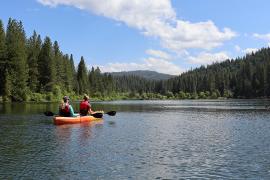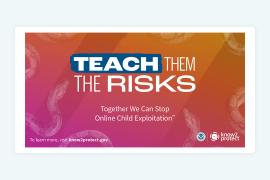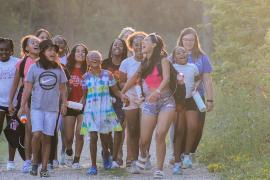Recently, during my training with camp staff about friendship skills, I showed them the video of Susan Pinker's TED Talk, "The Secret to Living Longer May Be Your Social Life."
I then asked our staff to share what similarities they found between summer camp and the small village in Sardinia Pinker describes in her TED Talk.
They came up with these ideas:
- We live together in close quarters, sharing space.
- We eat every meal together, gathered together in “family” groups.
- We close each day gathered together around a campfire, sharing our highs, lows, dreams, and fears.
- We are isolated from the rest of the world, focused completely on our own community.
- We support and look out for each other.
- We take care of each other, each of us serving in different roles, using our own talents and skills.
- We express appreciation for each other.
- We greet everyone in our community with smile.
- Together, we unplug from our devices and live differently from the rest of the world, focusing on our face-to-face interactions (the kind Pinker describes as firing up the best parts of our brains).
I have done research on the positive impact of summer camp experiences on campers’ happiness and social skills, but I have not isolated the specific variables that lead to these positive outcomes for campers. I suspect, based on my research in positive psychology, that it is a combination of factors.
There are many camp practices that are known to decrease depression and increase well-being:
- Face-to-face connection time.
- Feeling a sense of acceptance and belonging.
- Being outside, in nature.
- Being more mindful, present, in-the-moment.
- Lots of play: singing, dancing, games.
- Adequate sleep.
- Trying and experiencing new things.
We need look no further than the recent tragic deaths of two celebrities, both thought to be “successful” by many worldly measures, to know the importance of focusing on other, much more important things as we carve out healthy, meaningful lives for ourselves and for our children.
Successful lives are created first from social connection and positive relationships. They are lives that end — ideally — at old age, surrounded by the few people with whom we have gone through life’s ups and downs. They are lives that – when we are faced with the inevitable depression, anxiety, and mental health issues that plague us all during different seasons and for different circumstances (both biological and circumstantial) — we have at least a few people who will know us well, support us, and help us get the intervention we need to heal – even if they have to knock down our door to do it.
If we strive for better connections, positive relationships, and the forming of close, village-like communities in our families, neighborhoods, religious institutions, clubs, and our work, we and our children are much more likely to achieve the “success” that we all need as humans – the success that is defined by a happy, healthy life.
That success only happens when we have close connections with others who will be there for us during our darkest days as well as our most celebratory moments. And those connections can only happen in community, with practice, and with the types of exercises and activities that can train our brains to view the world differently–not as a massive, complicated world impossible to navigate but instead as a small village, or a summer camp, where there are always people to lean on.
Photo courtesy of Gold Arrow Camp in Lakeshore, California.
Audrey “Sunshine” Monke, MA, with her husband Steve, has owned and directed Gold Arrow Camp (Lakeshore, California) for the past 30 years. She has been a member of ACA since 1989 and was president of the Western Association of Independent Camps (WAIC) from 2007–2010. Audrey researches, writes, and speaks about camp, parenting, friendship skills, and positive psychology. Her upcoming parenting book (Center Street, 2019) offers ideas for bringing the magic of summer camp home. Sign up for Audrey’s book updates at sunshine-parenting.com or contact her directly at [email protected].
Originally published at sunshine-parenting.com
The views and opinions expressed by contributors are their own and do not necessarily reflect the views of the American Camp Association or ACA employees.




